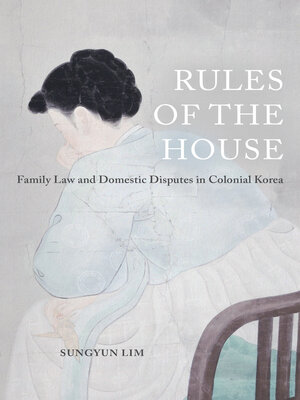Rules of the House
ebook ∣ Family Law and Domestic Disputes in Colonial Korea · Global Korea
By Sungyun Lim

Sign up to save your library
With an OverDrive account, you can save your favorite libraries for at-a-glance information about availability. Find out more about OverDrive accounts.
Find this title in Libby, the library reading app by OverDrive.



Search for a digital library with this title
Title found at these libraries:
| Library Name | Distance |
|---|---|
| Loading... |
A free ebook version of this title is available through Luminos, University of California Press's Open Access publishing program for monographs. Visit www.luminosoa.org to learn more.
Rules of the House offers a dynamic revisionist account of the Japanese colonial rule of Korea (1910–1945) by examining the roles of women in the civil courts. Challenging the dominant view that women were victimized by the Japanese family laws and its patriarchal biases, Sungyun Lim argues that Korean women had to struggle equally against Korean patriarchal interests. Moreover, women were not passive victims; instead, they proactively struggled to expand their rights by participating in the Japanese colonial legal system. In turn, the Japanese doctrine of promoting progressive legal rights would prove advantageous to them. Following female plaintiffs and their civil disputes from the precolonial Choson dynasty through colonial times and into postcolonial reforms, this book presents a new and groundbreaking story about Korean women's legal struggles, revealing their surprising collaborative relationship with the colonial state.
Rules of the House offers a dynamic revisionist account of the Japanese colonial rule of Korea (1910–1945) by examining the roles of women in the civil courts. Challenging the dominant view that women were victimized by the Japanese family laws and its patriarchal biases, Sungyun Lim argues that Korean women had to struggle equally against Korean patriarchal interests. Moreover, women were not passive victims; instead, they proactively struggled to expand their rights by participating in the Japanese colonial legal system. In turn, the Japanese doctrine of promoting progressive legal rights would prove advantageous to them. Following female plaintiffs and their civil disputes from the precolonial Choson dynasty through colonial times and into postcolonial reforms, this book presents a new and groundbreaking story about Korean women's legal struggles, revealing their surprising collaborative relationship with the colonial state.







